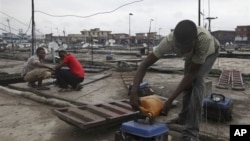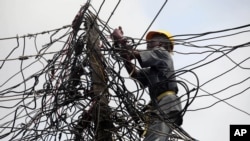ABUJA — Poor Nigerians have increasingly less access to electricity despite government efforts to increase the nation's power capacity, activists say.
But officials say their government, battling with militants in the north and oil saboteurs in the south, is working to transform the nation’s economy by implementing good-governance projects that include infrastructure development.
According to Agence France-Presse, Abuja officials on Monday signed a $23-million deal with Canadian firm Manitoba Hydro International (MHI) aimed at overhauling power transmission throughout Nigeria, Africa’s most populous nation.
The accord, which goes into effect July 30, obligates MHI to reorganize and partially privatize the state-owned Transmission Company of Nigeria as part of long-term plans to improve the country's dilapidated electricity network.
But in Abuja, activists say population growth means the percentage of electrical access among poor Nigerians is actually decreasing, while the number of electrical connections remains roughly the same.
Despite efforts to quadruple electrical output within the next few years, Ewah Otu Eleri, executive director of the International Centre for Energy, Environment and Development, says very little money is committed to programs intended to get electricity into the poorest rural areas.
“An increasing number of Nigerians are living without access to vital energy services that [would] allow them to generate income and escape poverty,” he said, describing the situation as both an economic and public health disaster.
According to figures from the National Bureau of Statistics, poverty has increased in recent years, with 61 percent of Nigerians living in "absolute poverty," lacking basic needs like food, shelter and healthcare.
Eleri says this forces most Nigerians to cook on traditional wooden stoves, pollution from which, according to the World Health Organization, claims nearly 100,000 lives each year, making it the county's third largest killer after malaria and AIDS.
While more than half of developmental aid sent to Nigeria is allotted for health programs, the power sector receives only one percent of the funding. The reason, Eleri says, is because government officials and international donors do not link issues of energy and health.
“There [are] resources, [but] there is absolute lack of political will," he said. "I think the government is so overwhelmed by the problems it faces today that critical issues such as providing energy services, extending the grid to rural areas, using off-grid solutions, investing in renewable energies that are so abundantly present in those rural communities, are not being exploited.”
Although Nigeria is Africa's biggest oil producer, it imports most of the fuel it consumes. Nigeria also has the world’s seventh-largest natural gas reserves, even though it exports far more than it uses.
With so many energy resources available in Nigeria, it is unjust that about half of its citizens have no access to power, activists say.






